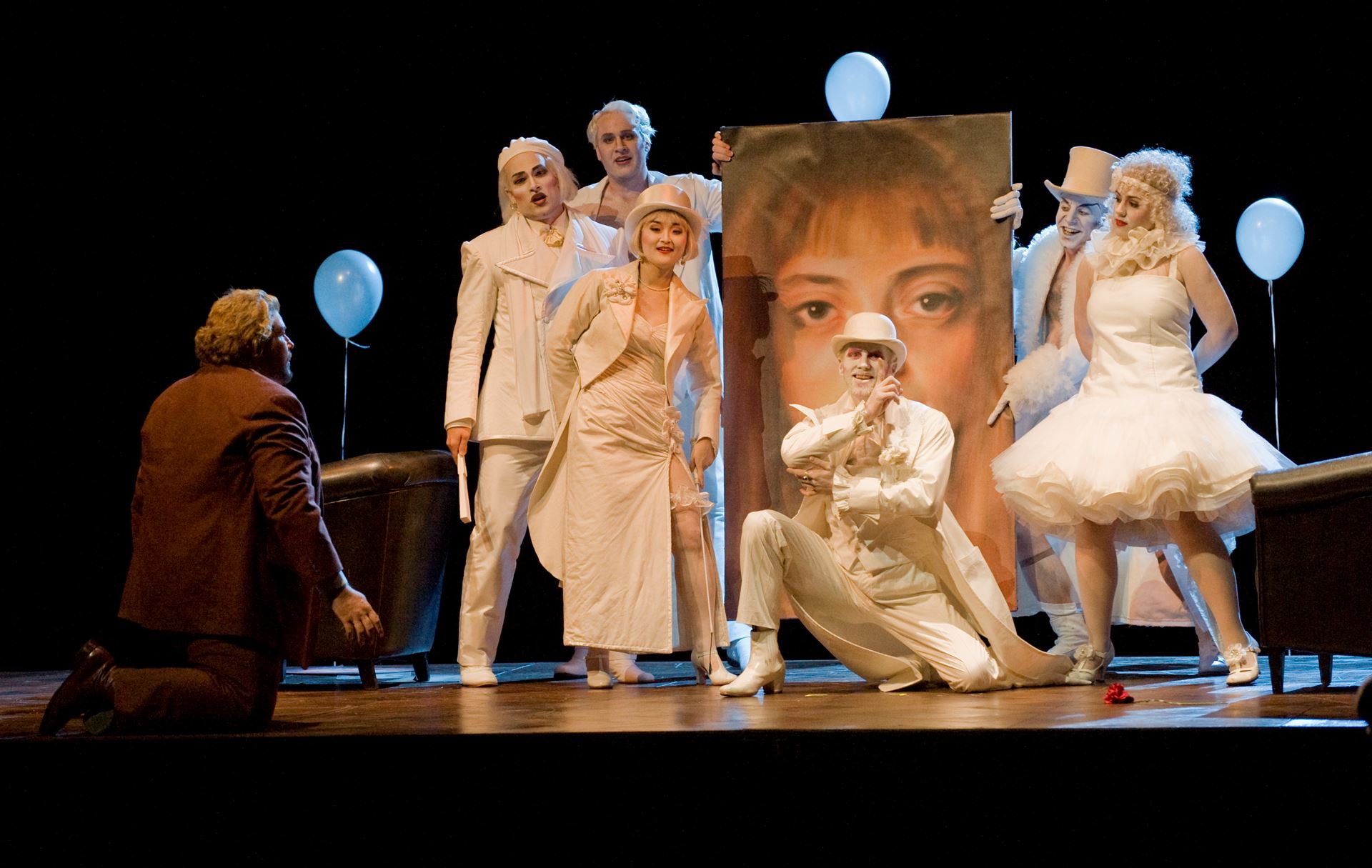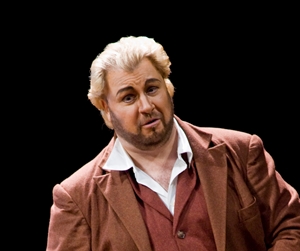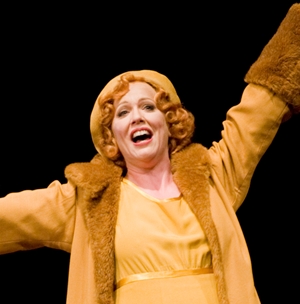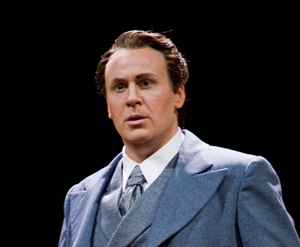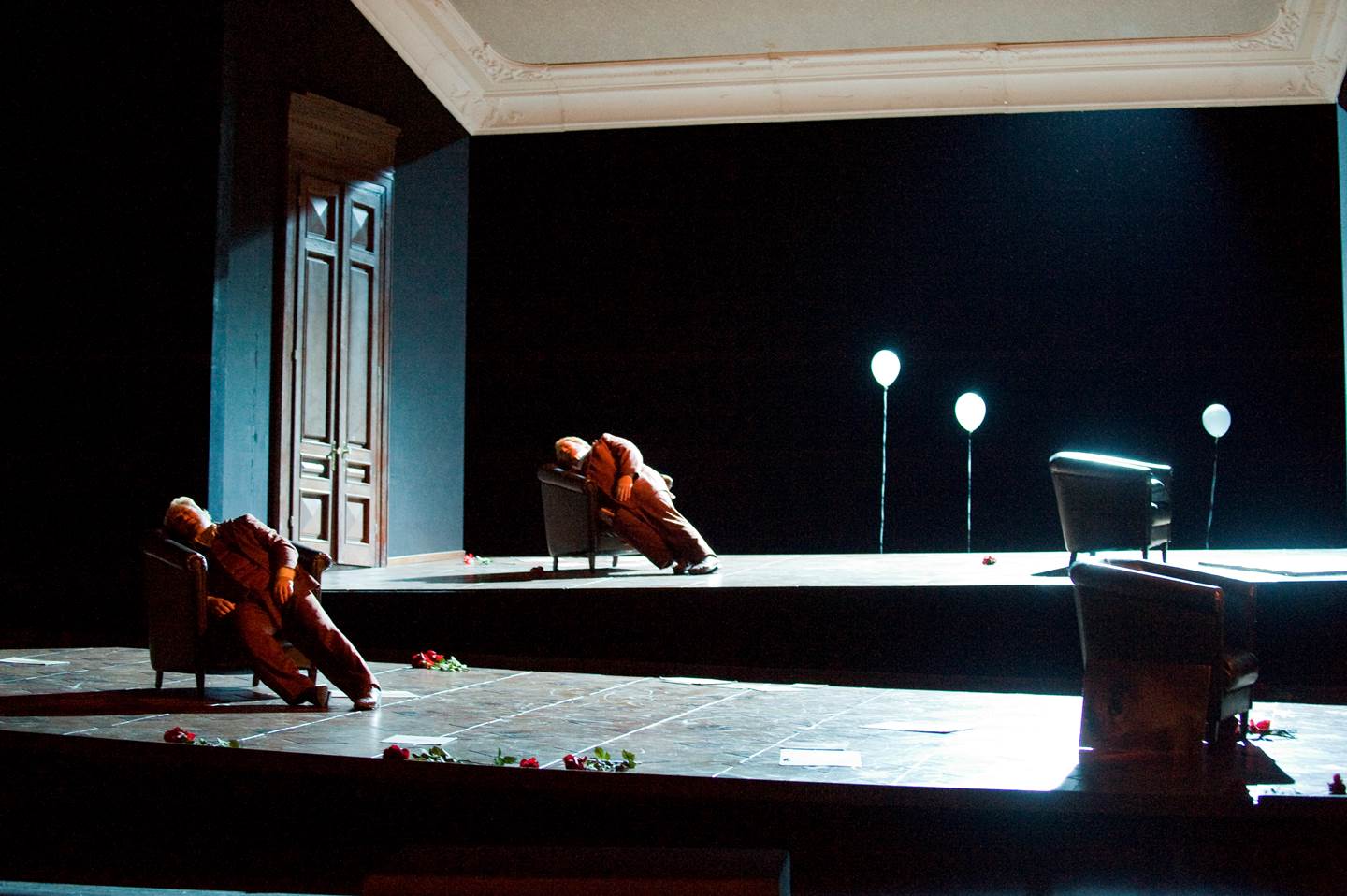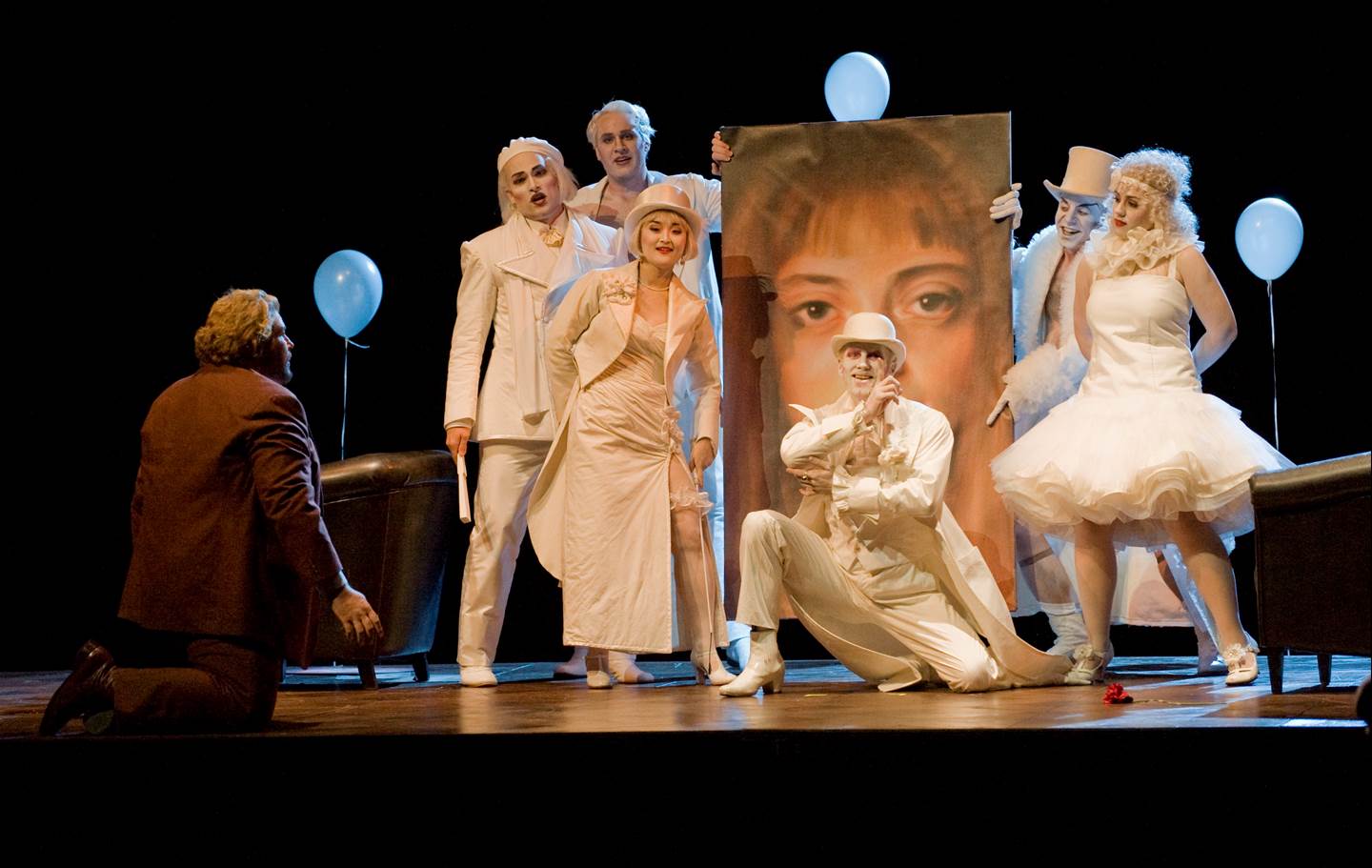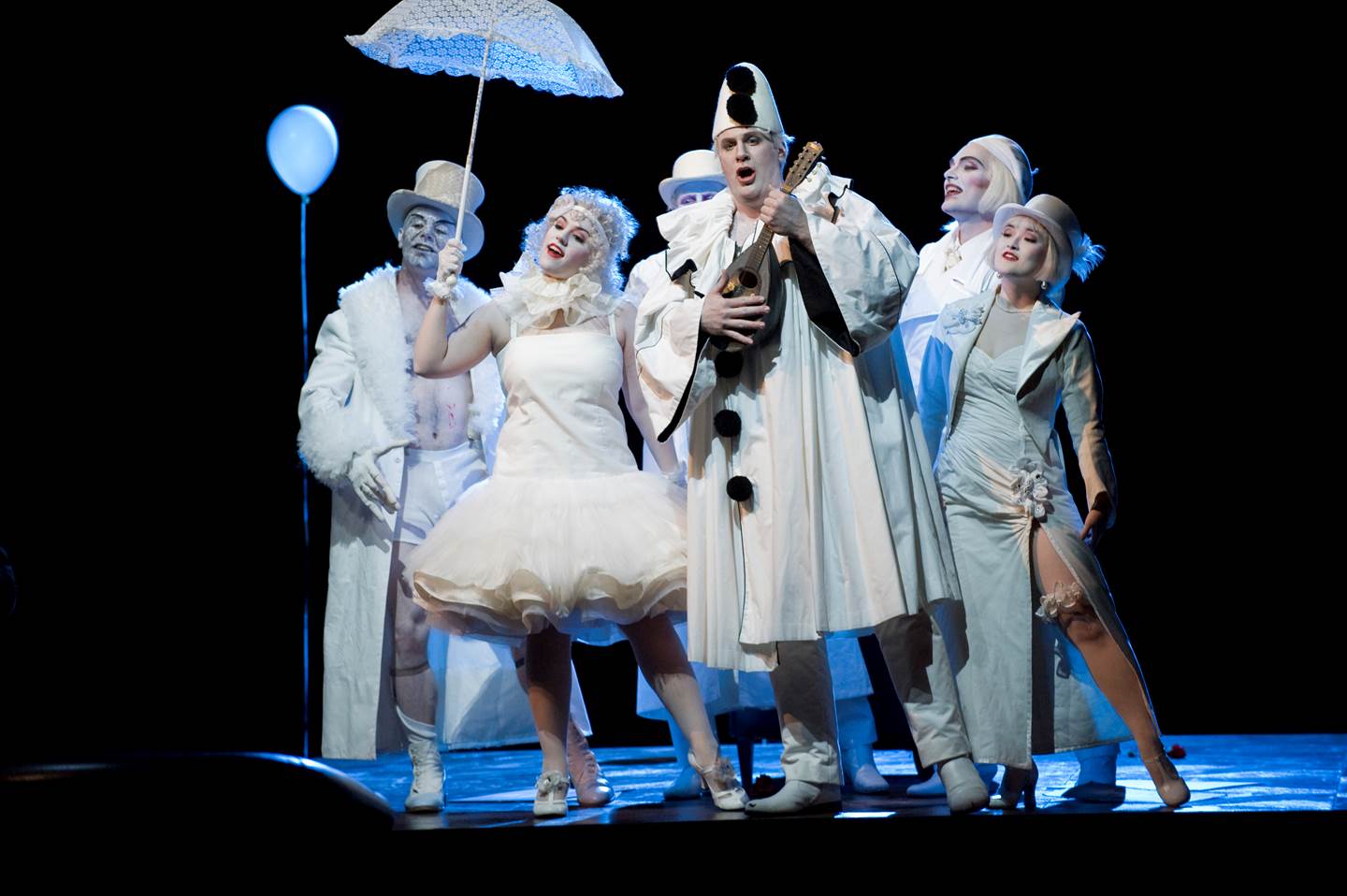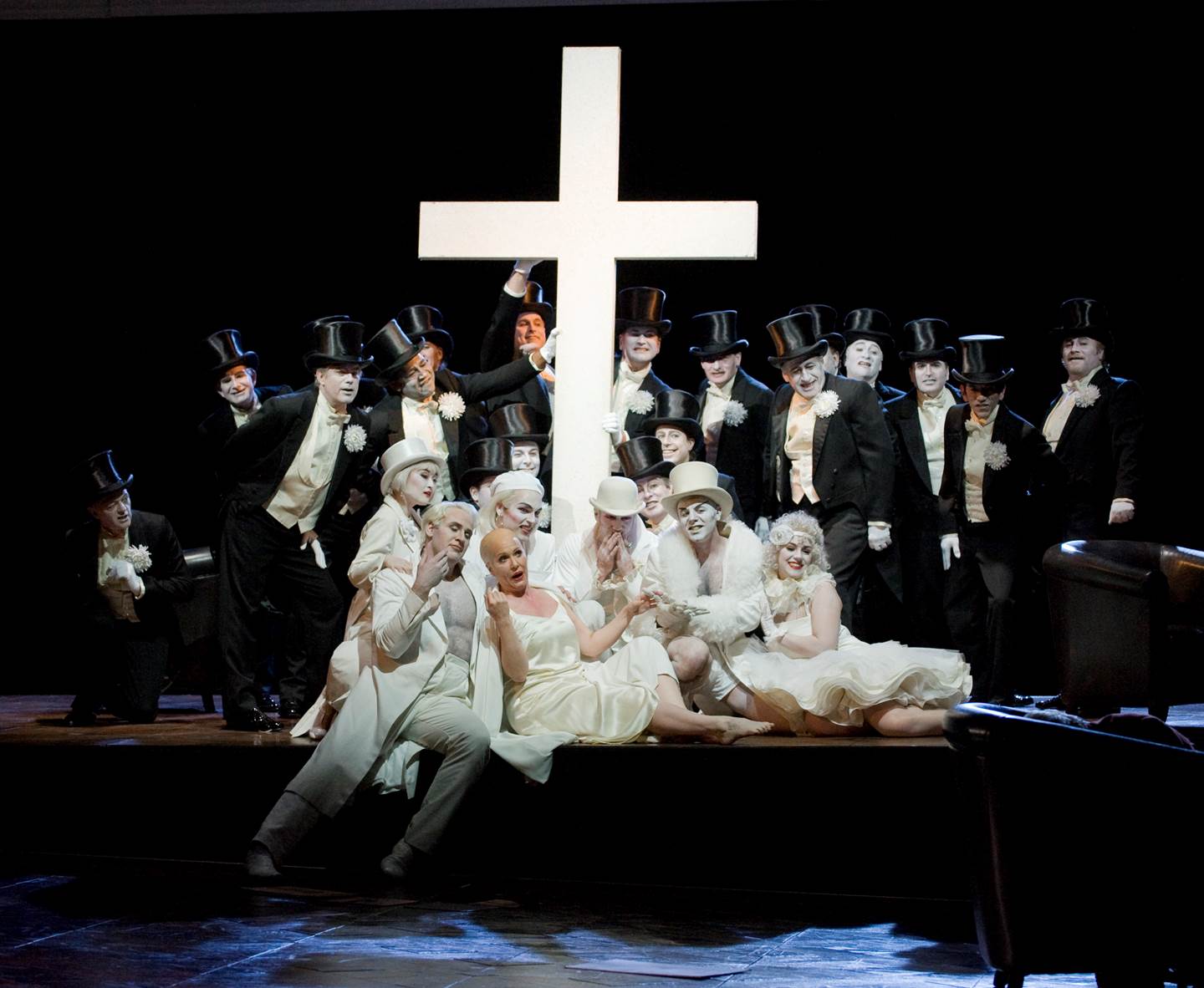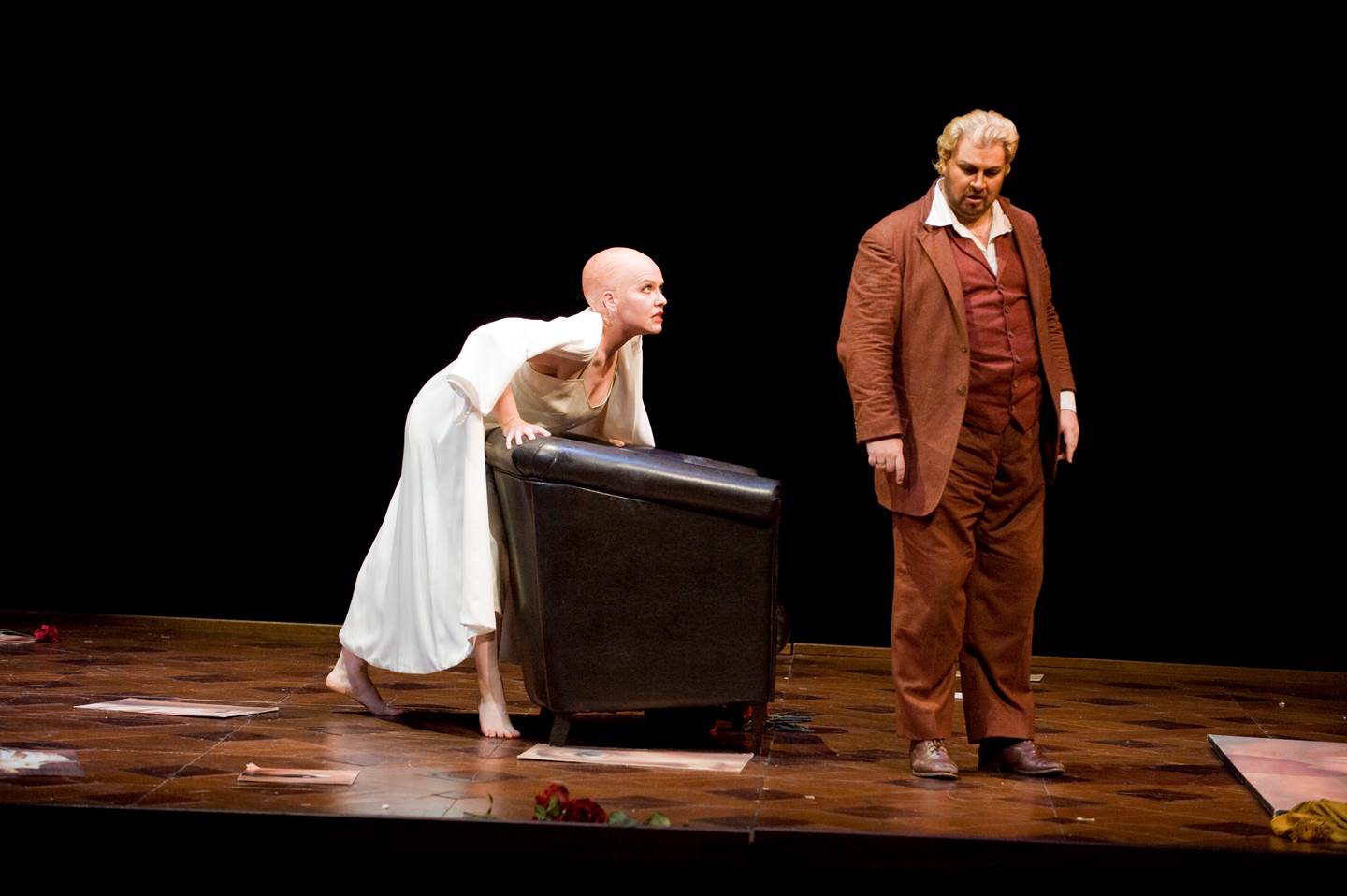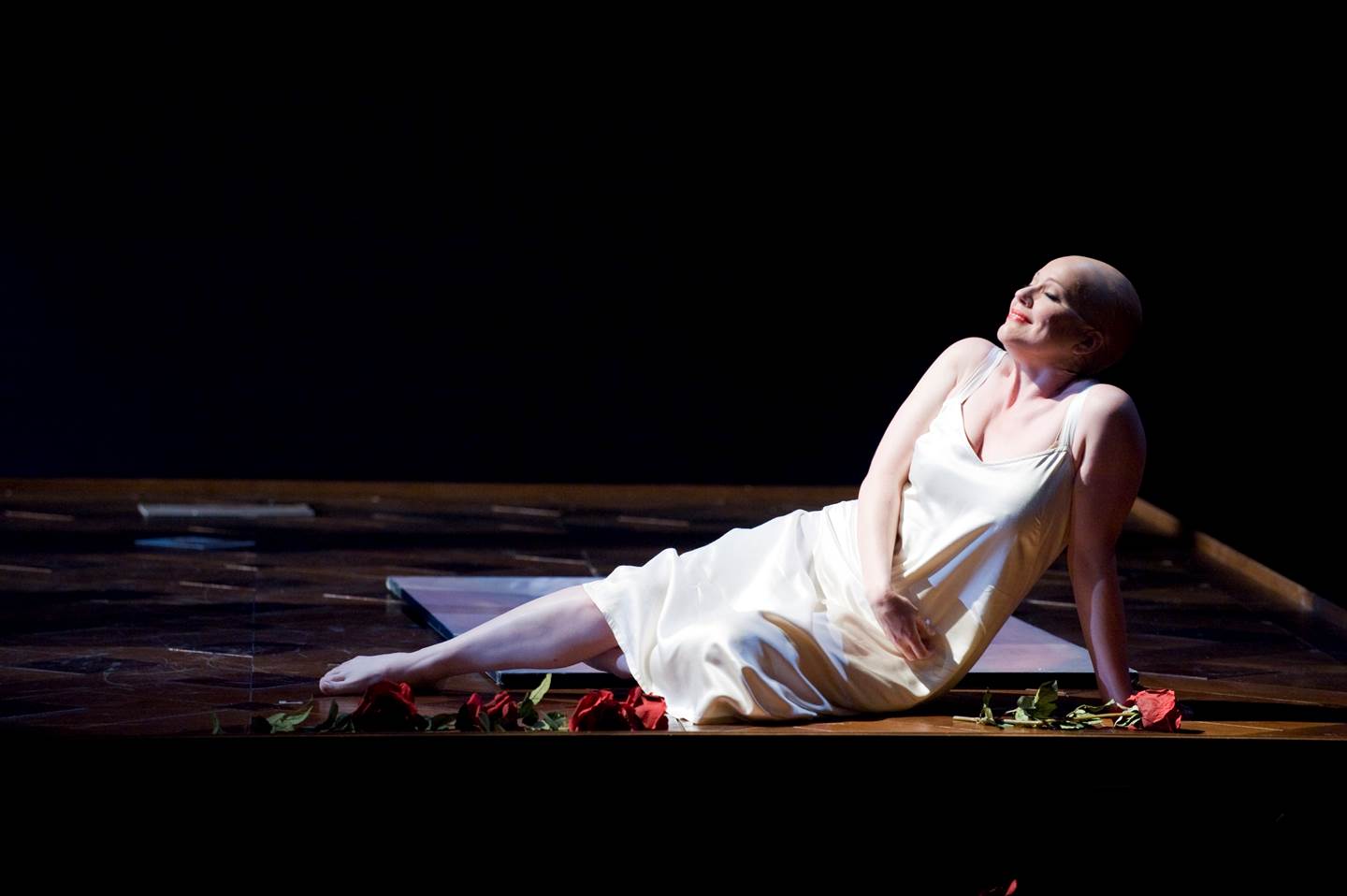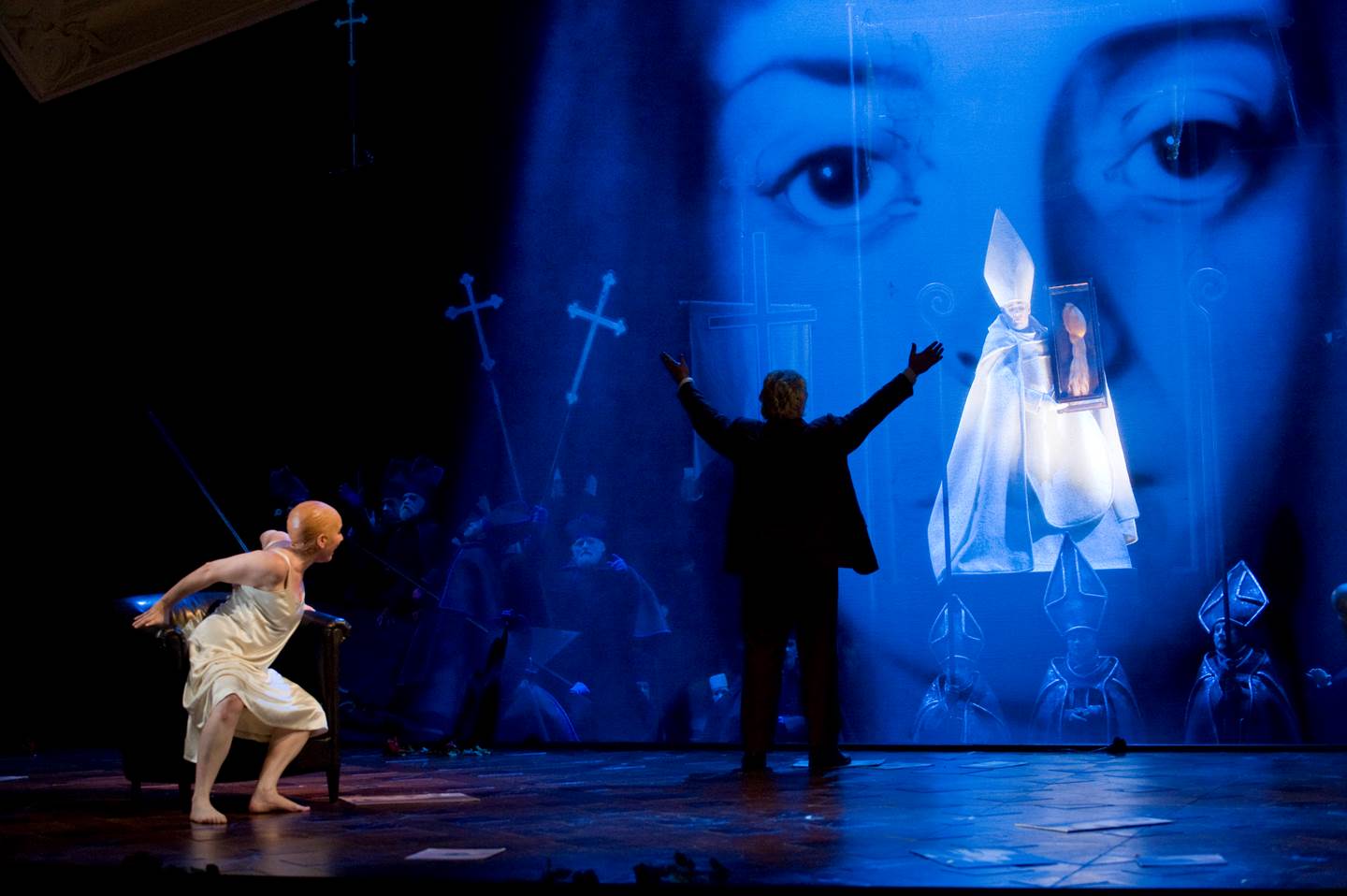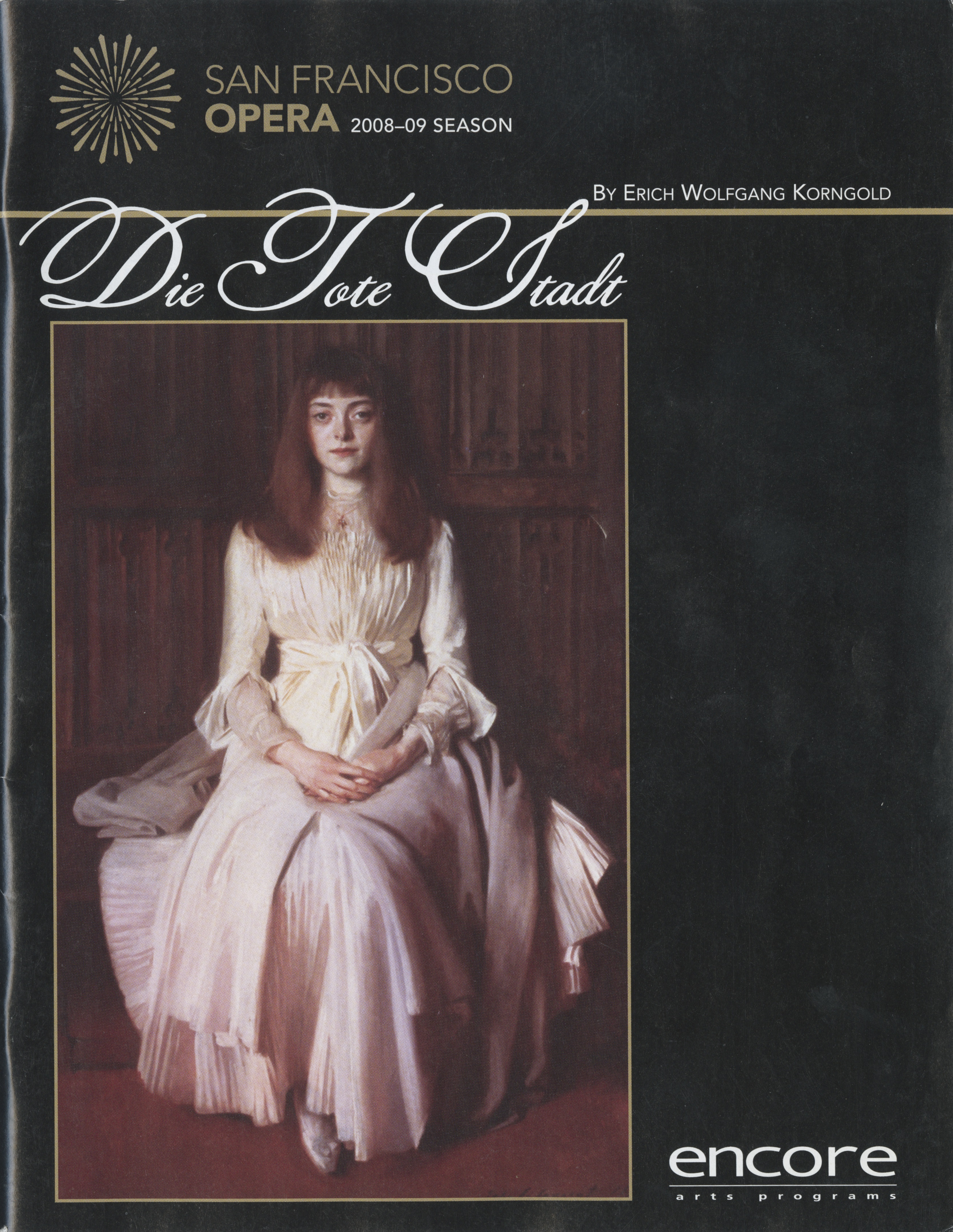By Larry Rothe
How shall I mourn thee? Let me count the ways. Paul, the hero of Erich Wolfgang Korngold's Die tote Stadt, knows the answer to that melancholy twist on Mrs. Browning's question. Marie, his wife, has died. (How long ago? Korngold doesn't tell.) To say that her death has shattered him is to be generous and genteel. To say that it has deranged him is closer to the truth. Shattered and deranged, Paul puts his memory to work, and the task he assigns it is to resurrect Marie. Her portrait, her clothes, a lock of her hair: To you or to me, these simple properties are what they are and nothing more. To Paul, they unlock a darkened chamber of the mind no less real than the room of his house where Marie's relics are enshrined. Into the room, into his mind, Paul retreats, to reunite with the wife who has left him alone. Bruges itself, in whose shadows and along whose canals Paul and Marie once walked, evokes the past Paul yearns for. Bruges is the Tote Stadt of the opera's title, but Bruges is no less a dead city than the province Paul has staked out in his consciousness and where he languishes, cut off from the living. How shall I mourn thee? The question Paul might ask, and which he finally does ask, is not about the form his sadness should assume. He has that figured out. The question is how long his mourning shall continue. And until the final curtain he knows the answer to that one, too: forever.
Concepts such as "forever" puzzle and intrigue all of us, but we hardly expect someone just out of his teens to help us bridge the gaps in our knowledge of eternity. After four years of work on his score, Korngold completed Die Tote Stadt on August 15, 1920. He had celebrated his twenty-third birthday at the end of May, just two months earlier.
The music world had come to expect big thing from the precocious Erich Wolfgang Korngold. He was born in 1897 in Brno, in the old Austro-Hungarian empire. His father, Julius Korngold, soon relocated the family to Vienna, where he would succeed Eduard Hanslick as music critic at the Neue Freie Presse. Hanslick was a man of the old school, a critic best remembered today for his championship of Brahms and his vicious attacks on Wagner and musical modernism. In Julius Korngold he found a worthy successor. The conservative Julius gave his second son, Erich, the middle name Wolfgang in honor of Mozart, and Erich Wolfgang would begin to make his musical mark almost as early as Wolfgang Amadè had made his.
Imagine fin-de-siècle Vienna, a world unto itself, its intellectual and artistic atmosphere dominated by Klimt and Freud and Schnitzler, by the Secession artists, by musicians such as Gustav Mahler and Alexander von Zemlinsky. This world, headed for extinction after the Great War, was the world that nurtured the young prodigy and to which his music looks back with such longing. His artistic response to this Vienna began early and seemed instinctive. At five, he exhibited an intuitive grasp of theory. At ten, he played his own music for Gustav Mahler. Mahler did more than pronounce the boy a genius. He arranged for him to study with Zemlinsky.
Korngold's Opus 1 Piano Trio of 1909 received its premiere that year by musicians at the top of their game and who have passed into legend: Arnold Rosè, Bruno Walter, and Friedrich Buxbaum. The composer was twelve. The next year his ballet pantomime, The Snowman, orchestrated by Zemlinsky, received a command performance at the Court Opera for Emperor Franz Josef. Nothing seemed out of Korngold's musical reach, but older composers began venting their jealousy. Rumor spread that Zemlinsky had not only orchestrated The Snowman but that he had composed it and been paid for this project by Julius. True, Erich Wolfgang was writing music of which Papa approved, music that seemed to recall the previous century. Contemporaries such as Berg and Schoenberg were headed in a different direction, and it was not a direction that the Neue Freie Presse liked. Julius was an ideologue. You were either for him (and his son) or against him (and his son). Artists who embraced Erich Wolfgang were accused of using the son to curry favor with the father.
But for all the attacks he parried, Korngold was becoming one of Europe's most popular composers. His champions included the conductors Arthur Nikisch and Felix Weingartner, violinist Carl Flesch, pianist Artur Schnabel, and Richard Strauss himself. In 1916 Bruno Walter introduced Korngold's first operas, a double bill of one-act dramas, The Ring of Polykrates and Violanta. Finally came Die Tote Stadt, given its world premiere on December 4, 1920, simultaneously in Hamburg (where Egon Pollak conducted, Maria Jeritza sang Marietta, and Aagaard Oestvig took the role of Paul) and Cologne (with Otto Klemperer conducting and his wife, Johanna, singing Marietta, with Karl Schroder as Paul). Within a year the work was presented on eighty different stages and made its way to the Metropolitan Opera, the first German opera to be presented there after the Great War, with Jeritza again singing Marietta, a role conceived with her in mind. Die Tote Stadt marked the high point of Korngold's career. Before interest in Korngold began to be rekindled thirty years ago, he was remembered primarily as a composer of film scores. Although his achievements in movie music remain among the greatest of all time, and although he single-handedly created the lush, symphonic sound of Hollywood's Golden Age, the "serious" music community had nothing good to say about a composer who, it was assumed, had sold out.
Even his father was worried that his son was squandering his talent. After his marriage in 1924, Erich Wolfgang felt increasing pressure to be a good provider. He began working with director Max Reinhardt, re-scripting and re-orchestrating operettas. At the same time he began what he thought of as his operatic masterpiece, Das Wunder der Heliane, a long, densely orchestrated work that never caught on and that disappeared quickly after its premiere in 1927. Korngold came to Hollywood in 1934 to supervise the music (all by Mendelssohn) for Reinhardt's version of A Midsummer Night's Dream. Soon, Warner Bros. had him snared. He contributed an original score for Captain Blood then for Anthony Adverse. He continued to think of Vienna as his artistic home, but he realized, in 1937, that his days there were numbered. As a Jew in a country that was drawing ever closer to Hitler's Germany, his situation was untenable. Hollywood offered not only work, but an escape route. He bought a house on Toluca Lake Avenue and settled in with his family.
The story of Korngold's last decade is sad. When at last he called an end to his movie work, he said that "a film composer's immortality stretches all the way from the recording stage to the dubbing room." From time to time, upon too much reflection, he must have been driven crazy, knowing that his decision to work in Hollywood, while it saved his life and the lives of those he loved, also had diminished his artistic credibility.
In 1946, determined to return to the concert hall, he composed a violin concerto that earned the admiration of audiences, if not critics. His magnificent Symphony in F was a different story. He took it with him to Vienna in 1954—Vienna, where he hoped to re-establish himself—but its premiere on Austrian Radio in a performance that was under-rehearsed and poorly recorded was received with indifference.
When he died at sixty in 1957, few took note of his passing. German critics were especially vicious. In a 1958 obituary in the journal Musica, Karl Robert Brachtel noted that "it was a much discussed question, whether his father's position opened the way for the young Erich Wolfgang or not .... Today one encounters Korngold's name primarily as the arranger of classic Viennese operettas ... or as composer for various American films ... . The bulk of Korngold's output lies qualitatively and quantitatively in his youth. His voice was hardly original—the premature heralds of his supposed importance placed him next to Richard Strauss and Pfitzner .... He did not stand next to them, but in their shadow."
But the story ends happily. In 1972, RCA released an album of Korngold's film music, newly recorded, that finally allowed listeners to hear the full spectrum and depth of the composer's distinctive sound. The album was a hit, and a sequel soon followed. In 1975, Die Tote Stadt received its first complete recording. Not everyone was convinced. When New York City Opera revived the work that same year, Andrew Porter, writing in The New Yorker, described the music as "tawdry—Strauss and Puccini, plus dashes of Mahler and Debussy, served in syrup," also suggesting that Korngold "borrows freely from successes of the time. The prelude to Act II... is a tribute to the prelude to Act III of Tosca. Marietta's divertissement with her admirers, in Act II, owes all to Zerbinetta's with hers, in Strauss's Ariadne auf Naxos. The portrait that comes to life and sings, at the close of Act I, and the key to Marietta's room that Paul sees in the hand of a rival, in Act II, are from The Tales of Hoffmann."
Correspondences, perhaps. But only those eager to lake Korngold to task for being Korngold are apt to interpret them as plagiarism. To be an advocate for Korngold is not to reopen the debate about musical values, about "serious" music versus music designed to entertain and calculated to please. No defense need be made for anything that offers as much sheer pleasure as his music does. Today, Korngold's Violin Concerto has become a repertory staple, and fine performances of the Symphony abound on recordings. More of his music is readily available now than at any time since the late 1940s. Our regard for film music has also risen, no doubt because of the fine composers who have gone on to write for the screen, many of them inspired by Korngold's example. There's no denying, though, that much of Korngold's Violin Concerto and even the Symphony sounds as though it comes from a different world than that of the mid-twentieth century.
It does come from a different world. Korngold was a man of another time. He was also a great composer. No work illustrates his genius more clearly than Die Tote Stadt. Here we find him at his best.
The opera took its inspiration from the 1892 novel Bruges-laMorte by the Belgian writer Georges Rodenbach. Philip Mosley, in the introduction to his English translation, tells us that the book is "generally recognized as a major work of ... the symbolist movement." Not being a student of that movement, I will take him at his word and only add that I find the novel as uninviting as it is short. Hughes, widowed for five years (Rodenbach supplies this information; Korngold withholds it), is obsessed with the memory of his dead wife. His most cherished relic is also the most morbid, a braid of her hair. On one of his melancholy walks, where the towers and bridges of Bruges itself seem to speak to him of death, he encounters his wife's doppelganger, Jane Scott, a dancer at the opera. He befriends her, establishes her in her own apartment, asks her to dress in his dead wife's clothes (premonitions of Hitchcock's Vertigo), imagines he loves her. But his departed was a saint. Jane is coarse-natured, a materialist to the bone. Eventually she tires of being Hughes's kept woman and demands entrance to his home. There, she mocks his grief and commits the unpardonable sin of lifting the braid from beneath its protective glass bell. Hughes is enraged. He grabs hold of the braid and with it strangles the poor woman, whose major offense was her insensitivity. This punishment, so out of proportion to the crime, is only one element that robs Bruges-la-Morte of credibility. Reality never stood between a symbolist and his art.
Rodenbach forced Bruges-la-Morte into double duty and turned it into a play, Le Mirage. Translated into German by Siegfried Trebitsch as Das Trugbild, this became the source of Die Tote Stadt. The two Korngolds, father and son, wrote the libretto themselves, but since Julius's involvement would have been seen as an obvious conflict of interest, the authorship was credited to a nom de plume, Paul Schott-after Schott, Korngold's publisher, and Paul, his Tote Stadt protagonist. Paul, in the opera, is Rodenbach's Hughes, while the novel's Jane Scott becomes Korngold's Marietta. These changes are minor. The altered ending is huge. Bruges-la-Morte concludes with Jane's murder. Period. That might have suited Alban Berg. It did not suit Korngold, who was of a generally upbeat disposition. To give Paul more audience appeal and to offer a hopeful ending, Julius suggested that Paul at last awake from a dream, his "murder" of Marietta having been pure fantasy. Certainly this was long before focus groups began to influence the plots of films and fiction, but it may strike you as a cop-out worthy of the Hollywood to which Korngold was headed. It is not.
What we hear first are three sharp stabs of sound, bright with the bell-like timbre of celesta and high winds, followed by a knocking in the timpani and low brass. This does more than rivet attention. It announces the arrival of Paul's friend Frank. Frank alone understands how Paul's grief traps him in the past. "My friend, the depth of your feeling has unhinged you, and it must also heal you," he will say as he walks off early in Act I, to reappear briefly in the nightmare of Act II, and again at the close of Act III. In the opera's last moments, it is Frank who will offer Paul escape from Bruges and what Bruges represents to him: Marie, the wife he has lost and of whose memory he must finally let go.
But that comes later. For now, back to those first sounds, heralding Frank's presence. No sooner do we hear them than a rush of strings in a series of rising phrases leads to the first broad major-mode statement by full orchestra. Is it too much to read this as a variant on something we will hear twenty-five minutes later in gentler demeanor?—the first phrase of Marietta's famous song. Korngold left little to chance. At the same time, he understood how art works subliminally. An opera is a sound-world, and in the best of those worlds every nuance reinforces the total impact. Here is nuance from the get-go. Marietta's Song is the key to the opera, and its opening phrase, the one mirrored in the orchestra's first full-bodied proclamation, is "Glück, das mir verblieb": "Happiness [ or joy, or good fortune], which stays with me .... " This is not as straightforward as it seems. Paul believes the spirit of his dead wife, Marie, stays with him, and that in Marietta she has returned. The ear tuned to German hears verblieb (past tense of verbleiben: to stay, to remain) but immediately forms an association with another verb whose first syllable is "ver," verlor, past tense of verloren: to lose. Each step forward, every gain made, is set into relief by its opposite, as Fritz the harlequin will emphasize in Pierrot's Tanzlied ("Dance Song"), the Act II
counterpart to Marietta's Song: "im Tanze gewann ich, verlor ich mein Glück"-"Dancing, I won and lost happiness." Of course, the emotional chiaroscuro works both ways, as in an Escher print, and verloren can as easily bring verbleiben to mind. When the opera ends, Paul understands that, just as happiness can be lost, its very departure is likely to spur a search to regain it. So: Fifteen seconds into the opera, and before a word is uttered, the drama's tensions have been outlined.
Part of the pleasure Korngold offers in Die Tote Stadt, and which we experience from its first bars, is his spectacular orchestration. This is the largest orchestra he would ever use. The richness he draws from it is always in perfect balance, and he distributes his resources so that the sound is at once dense and brilliant. But this opera is not simply about big gestures. Korngold loved the orchestra and what it could do. Again and again we encounter it as an actor in its own right.
Consider the way Korngold deploys the orchestra in the opera's three show-stopping moments. In Act I, Paul's maid Brigitta is given a soaring aria in which she herself quits claim to love while serving in a household she believes is filled with love. When she leaves off, the orchestra takes up ("with great warmth," Korngold specifies), going in several unimaginable directions at once so that all threatens to come unhinged but never does. This is ecstasy, turned into music. Marietta's Song, also in Act I, is as seemingly simple as a hymn tune, yet its unpredictable phrase lengths and shifting meter keep it fresh. The celesta that introduces it lends it a dreamlike quality. And as the second syllable of "Abend'' moves up a step to the word "sinkt" ("Evening descends ... "), harp and celesta dip in a trilling shimmer, like light escaping into dusk.
In Act II, in Paul's dream, Marietta's theater troupe has taken the stage. This commedia dell'arte ensemble is introduced against a tapestry of waltz-like sound, a translation into music of the art deco aesthetic. In a dark twist on Paul's fantasy of Marie's return, the troupe parodies the resurrection scene from Meyerbeer's 1831 Robert le Diable—introduced by an orchestral passage revealing Korngold at his most dissonant and reminding us that some contemporaries considered him disturbingly "modern."
The Tanzlied, sung by Fritz, the Pierrot, is introduced by light-fingered runs on the piano keys. Fritz begins a capella ("Mein Sehnen, mein Wahnen"), simple string and harp chords underscoring only the words "Sehnen" ("yearning") and "Wahnen" ("dreaming"). As he continues, the full complement of strings joins in, doubling the vocal line. Then something astonishing happens. When he speaks of his beloved's pleading blue eyes, which seem to say "Oh stay, don't leave me," a horn joins Fritz in a duet—the instrument's solitary, mellow sound reinforcing his poignant sentiments. Now the song enters a second phase: At "Zauber der Ferne" ("Magic of distant places"), the strings break away into a lilting waltz ("very tenderly and full of song," Korngold requests). When it seems the music can grow no more beautiful, when Fritz's heart is full to bursting, he pauses. Eight soprano voices enter and continue the vocal line in the only possible way, with the wordless exhalation "Ah." They accompany Fritz as he reenters and finishes his song. The word "enchanting" is not to be used indiscriminately. It was made to describe the Tanzlied, the opera's musical high point—and also, as Jessica Duchen points out in her biography of the composer, its structural heart and center.
Marietta's Song and Pierrot's Tanzlied both deal with love and parting, the theme that runs so powerfully throughout Die Tote Stadt. Hearing each of these, it is easy to imagine that music more lovely has never been written. They are in an almost literal sense show-stoppers. Each number halts the action, but in doing so, the power of their beauty demands that we examine our own reactions to beauty, that we ourselves reflect on our relation to the past. Having enlisted us, the drama can again move forward, with us more completely in its thrall.
"Paul Schott" fashioned a thrilling libretto from Rodenbach's dreary tale. Consider the challenges. Rodenbach's Hughes is not a sympathetic hero, and little more could be said for the Korngolds' Paul, were it not for the lines he is given and the music they inspired, words and music convincing us that Paul may be someone worth knowing. By Act III, when we understand that his self-absorption borders on the psychotic, we can still hope that he will come around, thanks in part to what he has shown of himself in (for example) his response to Marietta's Song. Nor should we forget that Pierrot's Tanzlied takes place in Paul's dream and, like his dream, is his creation.
Marietta embraces life as passionately as Paul clings to death, memory, and the past. The music that accompanies her entrance in Act I proved among Korngold's most perplexing tasks; but once he found his way to an abandoned waltz-gone-wild, he went on to use it as Marietta's signature music. By Act III, Marietta has proven herself a woman of considerable strength. She has pitted herself against the dead Marie, determined to have Paul for her own. But a strong woman is the last thing Paul wants. He grows increasingly distraught as Marietta revels in her sexual power and in the knowledge she is pushing him toward. As she recounts her own past and struggles, she tells Paul that the man who first taught her to love "was the one who destroyed me," and as she sings those words the orchestra echoes a theme that has come to be associated with Paul's dead Marie. What is he to make of that? Does he want to know? The relationships in Die Tote Stadt are rooted in psychological humus that extends far below the topsoil, and what you see is not always what you get. So when Marietta attempts to banish Marie, draping the sacred braid around her own neck—after all, a braid is just a braid, isn't it?—Paul reacts in the only way he can. He kills her.
But of course he has not murdered Marietta. It has only been a dream—a dream that Freud would have understood. For all along, Paul has been preparing his departure from the past. As he now knows-now that he has awakened from the purging of his subconscious—"the dead send us such dreams when we live in them and with them too closely. How far can mourning go before it ensnares us?" As he reprises Marietta's Song, he turns it from its original statement of false hope—"death will not separate us"—into a song of acceptance: "Farewell, my love. Life and death must part. We will not see each other here again." It is time to leave mourning behind, along with yesterday, along with Bruges.
Calm spreads and a hyper-emotional journey is over. Now, as you catch your breath, you wonder again how someone so young as Korngold was could have comprehended so much. Nothing, however, keeps a twenty-three-year-old from feeling deeply. What is astonishing is Korngold's technical power to convey that feeling. He was a master while most others his age were in their apprenticeship. True, he happened to begin his apprenticeship early. But you can never discount native genius—especially if part of genius is a willingness to wear your heart on your sleeve and to expose your most vulnerable spots, knowing that, for every listener who rejects you, who smells blood and goes on the attack, generations of others will love you for having given so much of yourself so completely.
Larry Rothe is the San Francisco Symphony's publications editor. He is the author, with Michael Steinberg, of For the Love of Music, published in 2006 by Oxford University Press and due to appear in paperback this fall.


